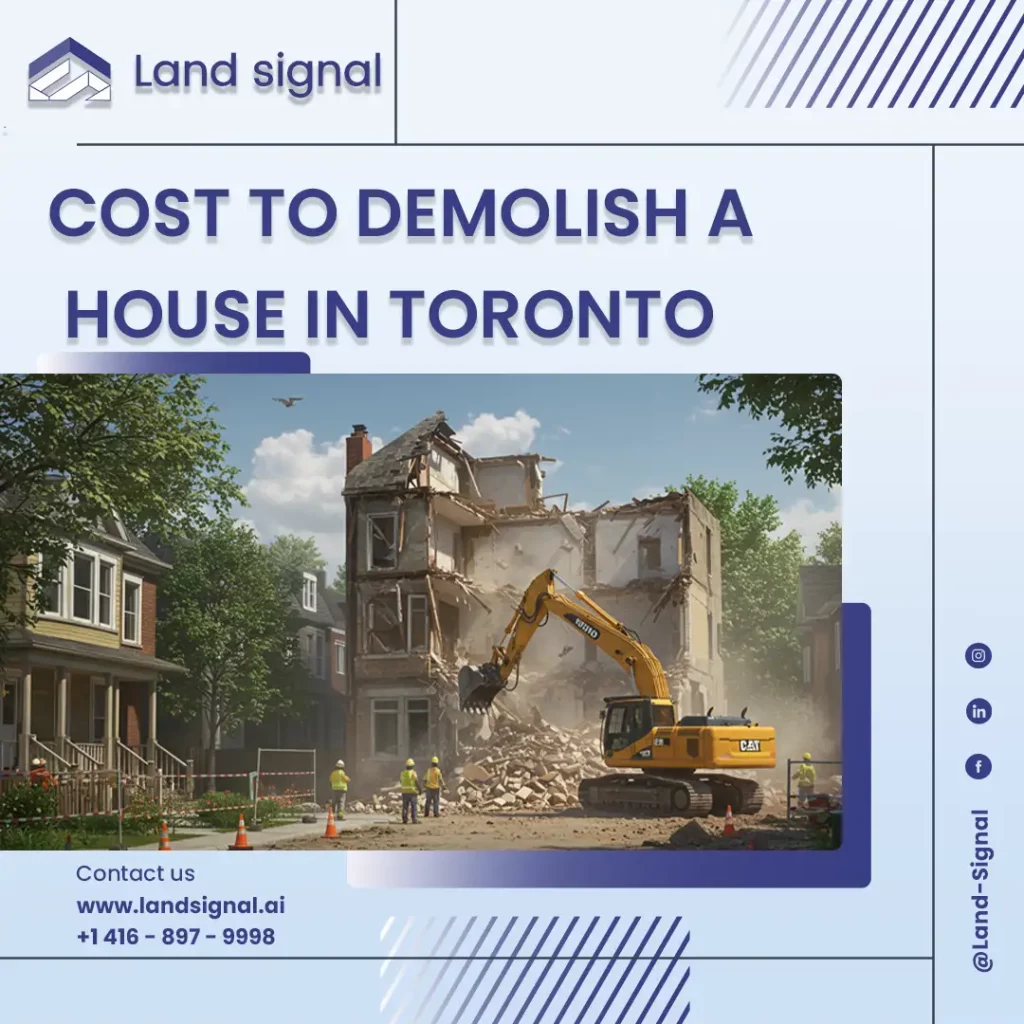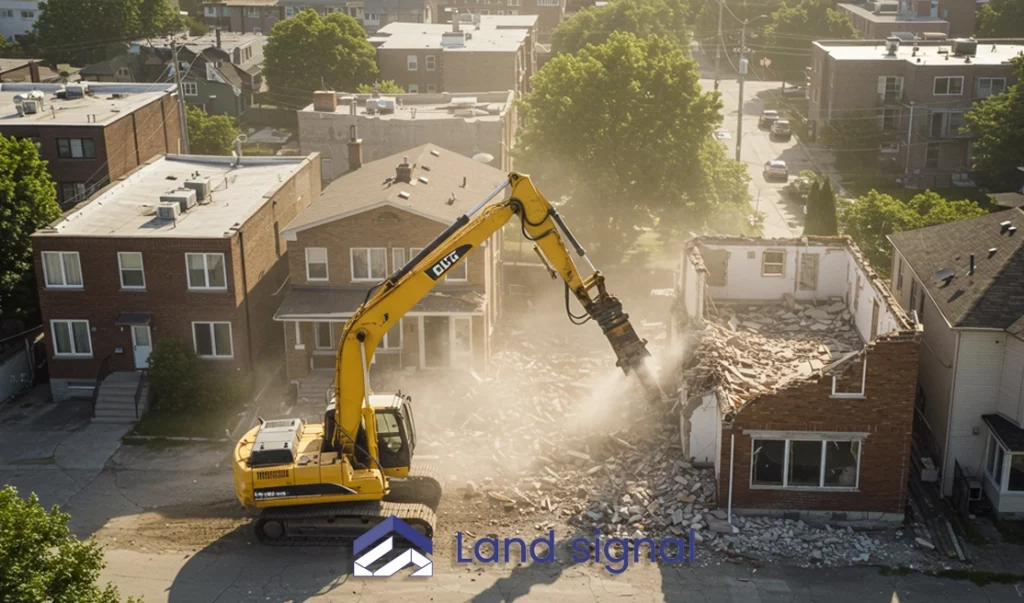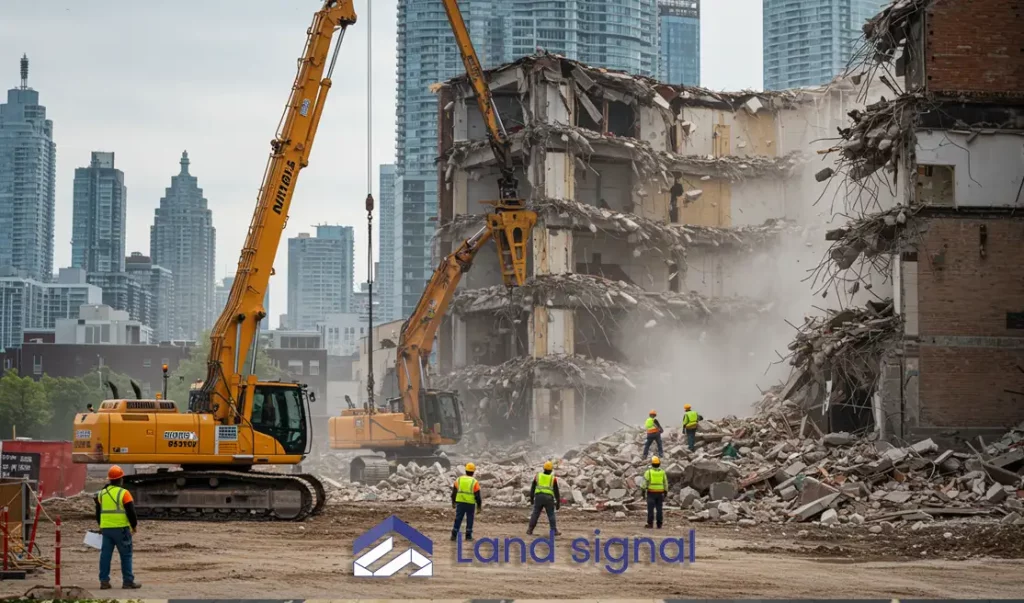Demolishing a house is a significant undertaking with substantial financial implications. In a bustling metropolis like Toronto, where property values are high and construction regulations are stringent, understanding the cost to demolish a house in Toronto is crucial for homeowners and developers alike.
This article provides a comprehensive overview of the factors influencing demolition costs in Toronto, offering insights into the average cost ranges, additional expenses to consider, the demolition process, and tips for accurate cost estimation. By understanding these key aspects, individuals can approach demolition projects with a clear understanding of the financial commitments involved and make informed decisions throughout the process.
Start Your Project with Confidence
At Land Signal, we assist with construction and renovation permits, as well as Garden House and Laneway Suite designs. Let our experts guide you through every step.
Understand the Average Cost to Demolish a House in Toronto
- General cost range: The cost to demolish a house in Toronto typically ranges from $10,000 to $30,000, with variations depending on several factors discussed in detail below. This broad range highlights the importance of considering individual project specifics when estimating costs. It’s crucial to avoid relying solely on general averages and obtain tailored quotes from reputable demolition contractors.
- Cost per square foot considerations: While the total cost is influenced by various factors, cost to demolish a house in Toronto can also be estimated based on the square footage of the house. In Toronto, the cost per square foot for demolition generally ranges from $4 to $10. This metric can provide a preliminary estimate, but it’s essential to remember that it’s just a starting point, and actual costs may vary significantly. Larger houses generally have lower per-square-foot costs due to economies of scale, while smaller houses may have higher per-square-foot costs.
Factors That Influence Cost to Demolish a House in Toronto
Size and Structure of the House
The size of the house, measured in square footage, directly impacts the volume of debris generated and the amount of labor required for demolition. Larger houses naturally incur higher cost to demolish a house in Toronto. The structural complexity of the house also plays a role. Houses with complex architectural features or multiple stories may require more specialized demolition techniques and equipment, increasing costs.
The materials used in the house’s construction also influence costs. Demolishing a house built with concrete or brick can be more expensive than demolishing a wood-frame house.
Location and Accessibility
The location of the house within Toronto significantly influences demolition costs. Properties in densely populated areas or those with limited access may require specialized equipment or more intricate demolition strategies, increasing expenses. Accessibility challenges, such as narrow streets or limited access to the property, can increase the time and effort required for demolition, driving up costs. Properties located further from disposal facilities may also incur higher transportation costs for debris removal.
Permit and Inspection Fees
Obtaining the necessary permits and inspections from the City of Toronto involves fees that contribute to the overall demolition cost. These fees vary depending on the scope and complexity of the project. It’s crucial to factor in permit and inspection fees when budgeting for a demolition project. Delays in obtaining permits can also impact the project timeline and potentially incur additional costs.
Read Also: A Comprehensive Guide Home Extension Permit Toronto
Utility Disconnections
Before demolition can begin, all utilities, including water, gas, electricity, and sewer lines, must be disconnected. The cost of these disconnections varies depending on the utility providers and the complexity of the disconnection process. Coordinating utility disconnections is a crucial step in the demolition process and should be factored into the project timeline. Failure to properly disconnect utilities can pose safety hazards during demolition.
Method of Demolition
The chosen demolition method significantly influences the overall cost. Different methods, such as manual demolition, mechanical demolition using excavators, or implosion, have varying cost implications. Manual demolition is typically more labor-intensive and time-consuming, while mechanical demolition is generally faster and more efficient but requires specialized equipment. The most appropriate demolition method depends on the specific characteristics of the house and the surrounding environment.
Additional Costs to Consider in the Cost to Demolish a House in Toronto
Debris Removal and Disposal
A substantial portion of the demolition cost is attributed to debris removal and disposal. The volume of debris generated during demolition directly impacts disposal fees. Disposal costs also vary depending on the type of debris and the disposal facility used. Proper waste management and recycling practices are essential to minimize environmental impact and potentially reduce disposal costs.
Sorting and separating different types of debris, such as concrete, wood, and metal, can facilitate recycling and reduce disposal fees.
Hazardous Materials Handling
If the house contains hazardous materials, such as asbestos, lead paint, or mold, specialized handling and disposal procedures are required. These procedures often involve additional costs for testing, removal, and disposal of the hazardous materials. Identifying and addressing hazardous materials is crucial for ensuring worker safety and environmental protection. Failure to properly handle hazardous materials can result in significant fines and legal liabilities.
Site Cleanup and Grading
After the demolition is complete, the site requires thorough cleaning and grading to prepare it for future construction or landscaping. This involves removing any remaining debris, leveling the ground, and ensuring proper drainage. The extent of site cleanup and grading required influences the overall cost.
Proper site preparation is essential for future construction projects or landscaping endeavors. Failing to adequately clean and grade the site can lead to problems with drainage, foundation stability, and landscaping aesthetics.
What is the Demolition Process?
1. Preparation
The demolition process begins with thorough preparation, including obtaining necessary permits, disconnecting utilities, and conducting a hazardous materials assessment. The site is secured, and safety measures are implemented to protect workers and the surrounding environment. Proper preparation is crucial for ensuring a smooth and efficient demolition process. This includes erecting fencing around the demolition site, establishing safety zones, and developing a detailed demolition plan.
A pre-demolition survey is often conducted to document the existing condition of the property and identify any potential hazards. Notification of neighbors and relevant authorities is also part of the preparation phase.
2. Demolition
The actual demolition phase involves the systematic dismantling or destruction of the house using the chosen demolition method. This may involve manual demolition using hand tools, mechanical demolition using excavators and other heavy equipment, or implosion in specific circumstances. The demolition process is carefully managed to ensure safety and minimize disruption to the surrounding area.
The demolition sequence is carefully planned to ensure structural stability throughout the process. Dust suppression measures, such as water spraying, are often employed to minimize airborne dust and debris. Noise control measures may also be implemented to mitigate noise pollution during demolition.
3. Debris Removal and Site Cleanup
Once the demolition is complete, the debris is carefully removed and transported to designated disposal facilities. The site is then cleaned and graded to prepare it for future use. Proper debris removal and site cleanup are essential for environmental protection and site restoration. Debris is typically sorted and segregated on-site to facilitate recycling and proper disposal. Hazardous materials are handled and disposed of according to specific regulations. The site is inspected after cleanup to ensure it meets environmental standards.
Tips for Accurate Estimation for Cost to Demolish a House in Toronto
- Get Professional Quotes: Obtain detailed quotes from multiple reputable demolition contractors. Compare the quotes carefully, considering the scope of work, included services, and pricing. Don’t solely rely on the lowest quote; consider the contractor’s experience, reputation, and insurance coverage. Ensure the quotes include a detailed breakdown of all costs, including demolition, debris removal, permits, and site cleanup. Request references from previous clients and contact them to inquire about their experience with the contractor. Verify the contractor’s insurance coverage and workers’ compensation insurance.
- Plan for Contingencies: Include a contingency fund in the budget to account for unforeseen expenses or delays. Unexpected challenges, such as hidden hazardous materials or difficult site conditions, can arise during demolition, requiring additional resources. A contingency fund of 10-20% of the estimated demolition cost is typically recommended. This helps to absorb unexpected costs and ensures the project can be completed within budget.
- Consider Recycling and Salvaging: Explore opportunities for recycling or salvaging materials from the demolished house. Recycling materials like concrete, wood, and metal can reduce disposal costs and minimize environmental impact. Salvaging valuable architectural elements or fixtures can generate revenue and offset demolition expenses. Donating salvaged materials to charitable organizations can also provide tax benefits. Recycling and salvaging contribute to sustainable demolition practices.
- Research Local Regulations: Thoroughly research local regulations and permitting requirements for demolition projects in Toronto. Ensure compliance with all applicable bylaws and obtain the necessary permits before commencing any demolition work. Failure to comply with regulations can result in fines and project delays. Consult with the City of Toronto’s building department to understand the specific permitting requirements for your project. Engage a permit expediter to streamline the permitting process.
Hiring the Right Demolition Contractor
Qualities to look for
When selecting a demolition contractor, consider their experience, reputation, insurance coverage, and licensing. Look for contractors with a proven track record of successfully completing demolition projects in Toronto. Verify their insurance coverage and licensing to ensure they operate legally and responsibly.
Obtain written contracts that clearly outline the scope of work, payment terms, and project timelines. Ensure the contractor has a dedicated project manager to oversee the demolition process.
Importance of experience and certifications
Demolition is a specialized field, and it’s essential to choose a contractor with proven experience and relevant certifications. Experienced contractors possess the expertise to handle complex demolition projects safely and efficiently. Certifications demonstrate their commitment to industry best practices and safety standards.
Look for certifications such as the National Demolition Association’s (NDA) Demolition Contractor Certification. Verify the contractor’s safety record and training programs for their employees.
Checking references and past projects
Thoroughly vet potential contractors by checking references and reviewing their past project portfolios. Contact previous clients to inquire about their experience with the contractor. Reviewing past projects provides insights into their workmanship, professionalism, and ability to manage demolition projects effectively. Visit completed demolition sites to assess the quality of the contractor’s work. Request detailed project timelines and ensure the contractor adheres to agreed-upon schedules.
Conclusion
Demolishing a house in Toronto involves significant financial considerations. By understanding the factors influencing cost to demolish a house in Toronto, the demolition process, and the importance of hiring a qualified contractor, homeowners and developers can approach demolition projects with a clear understanding of the financial commitments involved. Careful planning, thorough research, and open communication with reputable demolition contractors are essential for a successful and cost-effective demolition project in Toronto.
By following the tips outlined in this article, individuals can navigate the complexities of house demolition with confidence and achieve their desired outcomes while minimizing costs and environmental impact.







